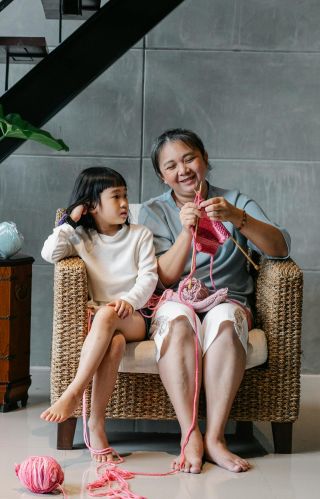Family Dynamics
The Lonely, Fractured Lives of Estranged Grandparents
"I'm so heartbroken I can barely breathe... Aren't I family?"
Posted March 6, 2024 Reviewed by Ray Parker
Key points
- Grandparents play a valuable role in grandchildren's lives, providing security and identity.
- Contact with grandparents is on the decline.
- A cultural shift towards severing ties with grandparents needs critical evaluation.

“You can live with a broken heart, and you can die with one. But it's terrible to have to do both.” —An estranged grandmother
Jessica is the 67-year-old mother of Robert, 42. She divorced his father when he was 6 and raised Robert as a single parent with little support.
During COVID-19, Robert and his wife Marie moved into Jessica's house for a year with their daughter after Robert lost his job in the restaurant business. Their daughter, Charlene, was 5 at the time. Jessica says:
“It wasn’t easy having everyone under one roof, but I really cherished that time with my granddaughter. I’d take her to school and pick her up every day, cook for everyone, and put her to bed most nights so they could go out or relax. I didn’t complain about it, and they didn’t complain about me as a grandmother. I could tell my daughter-in-law was jealous of how much my granddaughter was attached to me, but it didn’t ever come up as an issue other than the occasional glare in my direction.”
Jessica continues:
“Robert eventually got another job, they moved out, and I assumed I’d continue to be active in my granddaughter’s life. I was wrong. About two months after they moved, I got a letter saying they wanted to 'take a break from the relationship,' that they had problems with my 'lack of boundaries,' and suggested I go to therapy. I was confused, to say the least, but I wanted to know when I could see my granddaughter since this had nothing to do with her. My son said that the relationship with me was bad for his mental health, it was negatively impacting his marriage, and he needed to prioritize his family’s happiness. ‘Well, aren’t I family?’ I asked him and he said, ‘You know what I mean,’ and I said, ‘No I really don’t.’ He said, ‘If our relationship isn’t good for me, then it’s not good for our daughter.’ I’m so heartbroken I can barely breathe.”
Thousands of grandparents today have been cut off from contact with their grandchildren. While this sometimes results from the grandparent's highly problematic behavior toward the grandchild, my clinical experience, as illustrated in the case above, reveals that grandchildren are often a casualty of the conflict between parents and grandparents.
A recent Fortune survey revealed that contact with grandparents may be on the decline. While 41 percent of Gen X say they have a very close or strong relationship with their grandparents, only 18 percent of Gen Z acknowledged the same. This is tragic since studies show that the relationship between grandparents and grandchildren is not only good for the well-being of the grandparents but also the grandchildren's development.
Grandparents can make a grandchild feel more secure and loved. They can also correct problematic or even traumatizing behavior from the parents. In a non-estranged environment, grandparents can monitor problematic or dysfunctional family behavior and, where possible, intervene on behalf of the grandchild.
Grandparents also can serve as a rich resource of identity, history, and stories of family members. Because they are often more invested in perpetuating the family lineage, they may carry emigration stories, family recipes, clothing, or culture. Grandparents also provide a different role model of behavior for the child. They might have artistic or intellectual interests that speak to the grandchild, different from the parents'.
In short, grandparents can create a foundation of safety, security, and identity whose removal may be deeply hurtful and disorienting to the grandchild.
Our culture's disdain for aging reveals itself in the little regard accorded to the role of grandparents when family conflict occurs. Grandparents are viewed as one more relationship to be disposed of when they don't satisfy the criteria required to sustain today's parent–adult-child relationships. This is true even when the adult child acknowledges that the grandchildren loved the grandparent, as with Robert.
It is curious to me that a generation that has redefined what should be considered abusive or traumatizing child-rearing is so casual when it comes to casting a grandparent out of their own children's lives. For a generation obsessed with closely hewing to theories on attachment between themselves and their children, it is remarkable how many seem to disregard their children's profound attachment to their grandparents.
While this is often framed as modeling healthy boundaries and limits, one has to wonder, How healthy could it be? Is it good modeling to prize your feelings so much that you'll sacrifice your children's relationship on the altar of that aspiration? Is it a strength not to be able to separate your child's needs from your own?
Does it model healthy separation to assume that your children's mental well-being is so tied to yours that you can't imagine that your children benefit from a relationship with your parents, even if you find that relationship upsetting or difficult? What does that teach children about the value of older people and what they might contribute to life or society?
Most of the estranged grandparents I work with are bereft and confused. Cut loose from the insulating meanings of family, they survey a world where they have no place in the greater order of things. And like so many, they want to know, "What can I do to get my grandchildren back? What if I never see them again? What can I do to end this pain?"
Facebook image: SpeedKingz/Shutterstock
LinkedIn image: Chay_Tee/Shutterstock
References
Drew, L. M., & Silverstein, M. (2007). Grandparents’ psychological well-being after loss of contact with their grandchildren. Journal of Family Psychology, 21(3), 372–379. https://doi.org/10.1037/0893-3200.21.3.372
Gair, S. (2017). Missing grandchildren: Grandparents’ lost contact and implications for social work. Australian Social Work, 70(3), 263–275. https://doi.org/10.1080/0312407X.2016.1173714
Park, E.-H. (2018). For grandparents’ sake: The relationship between grandparenting involvement and psychological well-being. Ageing International, 43(3), 297–320. https://doi.org/10.1007/s12126-017-9320-8
Shrier, A. (2024). Bad therapy: Why the kids aren’t growing up. Sentinel.




